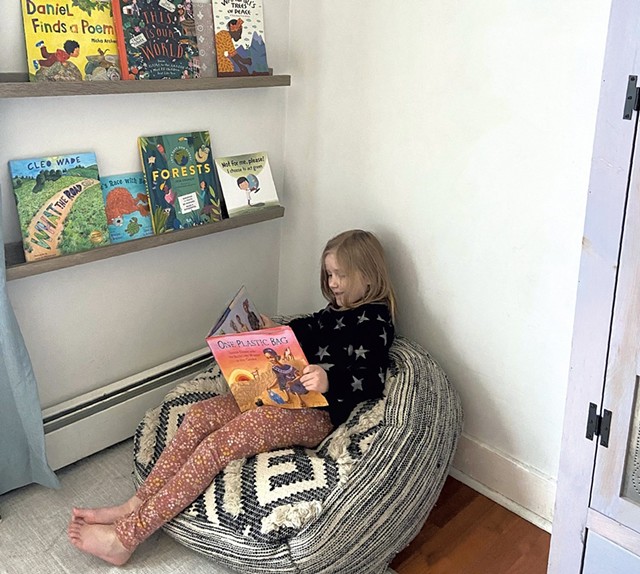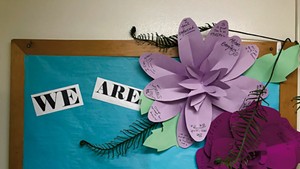
- Meredith Bay-Tyack
- Meredith's daughter reading One Plastic Bag
We celebrate Earth Day on April 22, but we can celebrate the Earth everyday. Small daily actions and choices add up. Though this might seem weird coming from someone who writes about being eco-friendly, I believe that individual actions matter but also acknowledge that most pollution is a direct result of decisions made by large corporations. For kids, writing letters with specific questions and suggestions to brands, both big and small, is a good way to teach them that their concerns matter and that their voice can make a difference.
Keep in mind that small local stores may not be in a financial position to make changes, but it doesn't hurt to ask if you or your child sees something that might be unnecessarily wasteful. When reaching out to brands or stores of any size, we focus on being kind, firm and focused. In the past, we've sent in questions like: "Why does your pasta come in plastic instead of a compostable material?"
An important way to stand up for the Earth is to do whatever we can to hold these businesses accountable for their impact on the planet. One way to do this is to get involved with an environmental advocacy organization. In Vermont, check out 350Vermont and the Vermont Natural Resources Council .
Throw out judgment
When we see trash on the ground in our neighborhood or elsewhere, we use neutral language, such as: "Someone left this trash here instead of putting it in a bin." If you have gloves or feel safe picking it up, show that we can all help each other without labeling people who litter as "bad."
I do not want my kids to litter and will share that trash left outside can harm wildlife and the environment. Equally important is making sure they aren't poised to make snap judgments about a community or an individual based simply on the fact that there's trash on the ground near their house. So many layered and complex factors are at play.
I also want to make sure they don't judge themselves or our family harshly for sometimes being wasteful. We're human, after all, so we make mistakes and are sometimes inconsistent. Plus, there seems to be so much single-use plastic that is unavoidable to a kid.
When my 6-year-old came home from school with a plastic grocery bag, she first said it reminded her of one of her favorite books One Plastic Bag. Then she said, "What do I do with this?" I was proud to see that she felt ownership over this item and didn't immediately see it as disposable, but also that she wasn't upset that she now had to deal with this "trash." We decided to store it in the kitchen and reuse it.
Mindful choices in the home
From DIY all-purpose spray cleaner to diluting castile hand soap, my kids are often involved in the maintenance of our day-to-day, eco-friendly practices. Again, I aim for neutral or positive language instead of demonizing more wasteful choices. For example, I'll say, "We use cloth napkins instead of paper ones because we like how well they work, and we can wash and reuse them instead of throwing them away."
At this point, these choices are barely visible to my kids. Since we haven't visited other homes over the past year, they likely assume everyone does the same things we do.
Respect and repair go hand in hand
Putting toys away when we're done playing with them makes rooms neater and reduces accidental trips and the possibility of breaking beloved toys. In the same way that we regularly maintain our spaces by cleaning them up, we maintain our belongings by repairing them.
Alongside the concept that things can be repaired and made like new is the idea of normalizing secondhand. From furniture and home wares to clothes and toys, we try to choose "new to us" over "new."
Kids tend to be drawn to concrete, feel-good examples of helping others, so when we donate something no longer useful, we say that we are passing it along to another family, just like we got an item of clothing or toy from the thrift store. Our possessions do have value, though, so sharing that you plan to sell or consign their outgrown clothing or other items is also important.
Be Mindful About Media
You've probably heard of the 3 Rs of reduce, reuse, recycle. My mom even had this mantra on a bumper sticker when I was growing up. You may have even explored the 5 Rs of refuse, reduce, reuse, recycle and rot, popularized by Bea Johnson of Zero Waste Home. Books are such a great place to start with learning about the planet — for kids and adults. If you ask my kids where they have learned about ways to be kind to the earth and why it's important to take care of the planet, they'll likely refer to a book or an episode of "Octonauts" or "Our Planet." While I do talk with my kids about the decisions we make in our home to reduce our impact, external sources sometimes stand out more for kids.
Resources
Books
- One Plastic Bag: Isatou Ceesay and the Recycling Women of the Gambia by Miranda Paul
- Let's Save Our Planet: Forests by Jess French
- Not for Me, Please! I Choose to Act Green by Maria Godsey
TV shows
- "Octonauts" (Netflix)
- "Our Planet" (Netflix)
- "Bino and Fino" (Amazon Prime)











Comments
Comments are closed.
From 2014-2020, Seven Days allowed readers to comment on all stories posted on our website. While we've appreciated the suggestions and insights, right now Seven Days is prioritizing our core mission — producing high-quality, responsible local journalism — over moderating online debates between readers.
To criticize, correct or praise our reporting, please send us a letter to the editor or send us a tip. We’ll check it out and report the results.
Online comments may return when we have better tech tools for managing them. Thanks for reading.